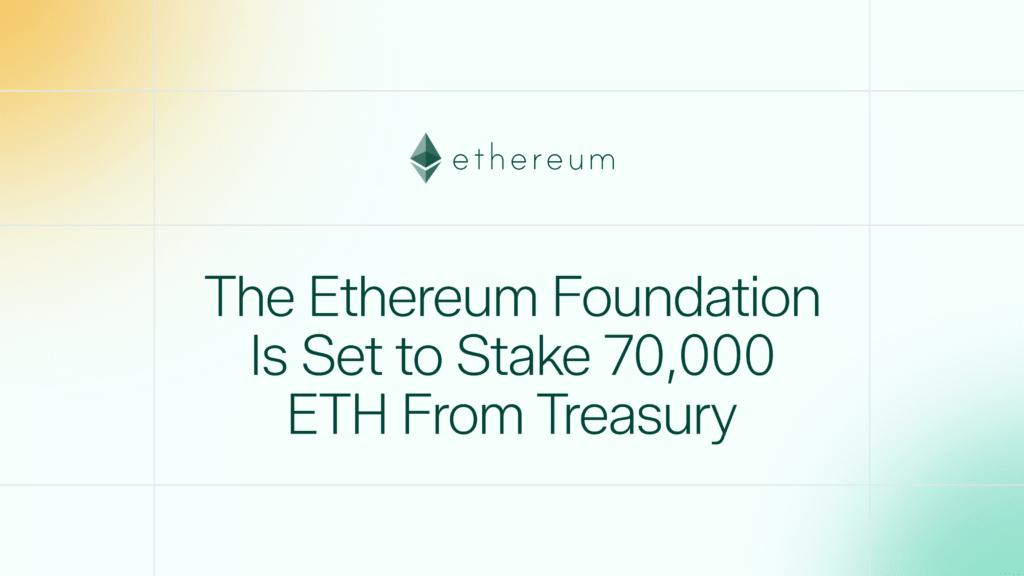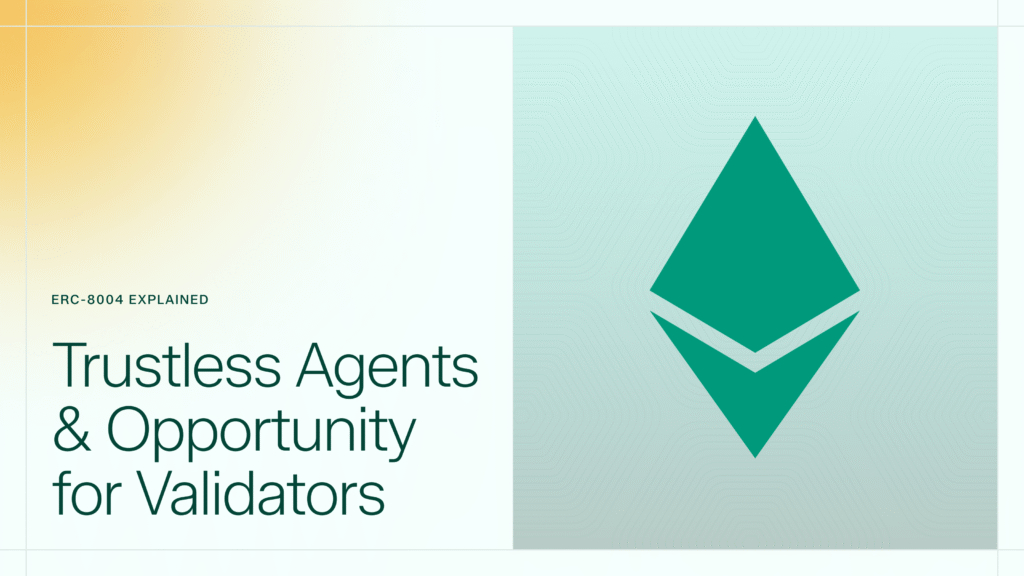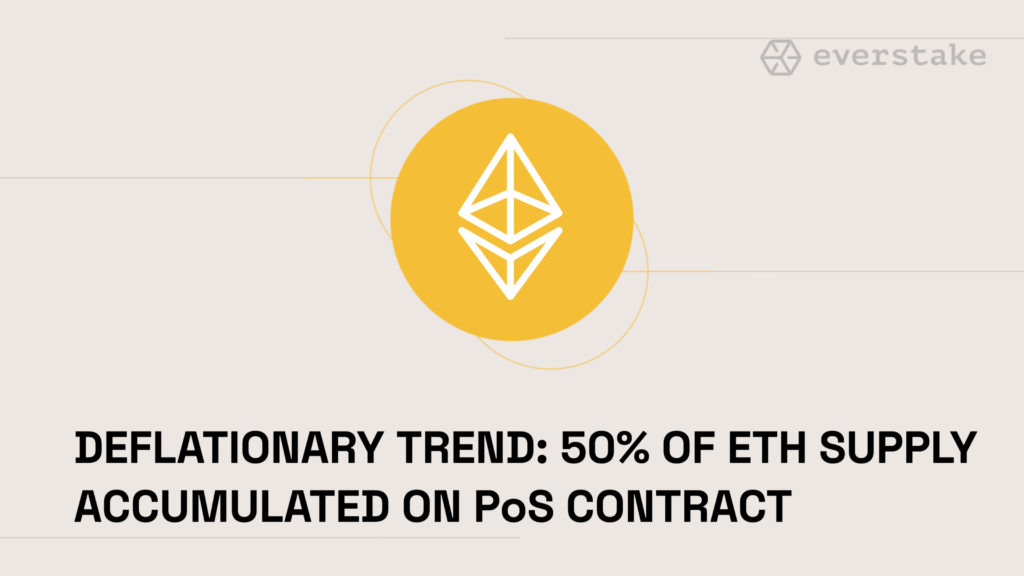
ethereum
A Conversation with Ethereum Foundation & Ecosystem Experts
What does Ethereum’s institutional future look like after Pectra? Everstake sits down with EF and ecosystem experts to talk validator scale, MEV risks, and whether the protocol is finally ready for enterprise staking.
JUN 30, 2025
In a post-Pectra world where Ethereum’s infrastructure looks more enterprise-friendly than ever, Everstake sat down with Ethereum ecosystem experts, including a representative from the Ethereum Foundation to explore what this means for institutional staking.
As institutional players continue to explore staking on Ethereum, a key question emerges: is the protocol truly ready to support enterprise-grade participation at scale?
Following the implementation of the Pectra upgrade, Everstake hosted an AMA session with Jason Chaskin, Ecosystem Intelligence Lead officially representing the Ethereum Foundation, and Eric Siu, a former contributor to ecosystem & special projects at Ethereum Foundation and Etherealize, to discuss post-Pectra world and how the Ethereum roadmap aligns with institutional needs, both now and in the near future.
We’ve edited and condensed the extract from the conversation for clarity and flow.
Everstake: Let’s start with the obvious: Does Pectra bring meaningful improvements to institutions entering Ethereum staking?
Eric: While the upgrade wasn’t designed solely with institutions in mind, some of the changes, like EIP-7251, simplify validator operations for entities managing significant capital.
More broadly, though, institutional concerns often fall into two categories. First, there are issues outside the protocol’s scope, like whether you are going to be allowed to have an ETH staking ETF. Second, there are protocol-adjacent concerns, like MEV-Boost, Commit-Boost, and the distinction between OFAC-compliant and non-compliant blocks, which can make things trickier for institutions.
But those challenges are solvable. Ethereum has the strongest product-market fit in areas where the stakes are high, whether that’s institutional finance or large-scale DeFi. There’s a reason this kind of activity happens on Ethereum and not elsewhere.
Everstake: How do you balance that neutrality with the practical needs of institutional validators?
Eric: Ethereum shouldn’t be making those calls at the protocol level; that’s the core principle of credible neutrality. However, institutions can still operate within those constraints by customizing their stacks.
This is where off-protocol solutions matter—things like relay policies or how you run your MEV-Boost clients. These aren’t protocol rules, but they define how institutions interact with Ethereum in practice. And let’s not forget: key management is critical. That’s where staking providers like Everstake and Lido have helped establish best practices. Institutional standards like SOC 2 or ISO 27001 don’t always map cleanly to Ethereum-native norms, but there’s a lot of shared ground.
Institutions are clearly interested. They want in, but they can’t afford mistakes. The margin for error is razor-thin, and the stakes, frankly, are massive.
Everstake: Looking further ahead, will future upgrades like Fusaka bring even more features for institutional or enterprise stakeholders?
Jason: Institutions are just one of many stakeholder groups within Ethereum. So, while upgrades aren’t developed specifically for them, their needs are taken into consideration.
For instance, allowing validators to consolidate more stake, as we saw with Pectra, is already a big win for institutional players. Interestingly, since the upgrade, the validator entry queue has grown significantly. It’s over 420,000 ETH right now. The wait time is more than a week. And that trend feels meaningful. Whether or not it’s directly because of Pectra, it shows momentum.
To your point about institutions being ready: Stripe, one of the world’s largest payment companies, just acquired Privy, the leading embedded wallet provider in Ethereum. They’ve also acquired a stablecoin startup. While they’re not directly involved in staking yet, this kind of infrastructure acquisition is a clear signal.
The runway is being paved. Ethereum is ready, and institutions are moving in that direction.
If more upgrades are needed to make Ethereum even safer or more robust for large validators, I’m confident they’ll happen. We’re in a very exciting phase of growth.
That said, we also need to think long-term. If someone like BlackRock becomes a major staker, how do we ensure Ethereum remains decentralized and not effectively controlled by a single entity? That’s a challenge we have to anticipate now, not react to later.
More broadly, I think Ethereum’s base protocol is already aligned with what enterprises want. They may not use the same terminology: what we call decentralization, they’ll see as “no counterparty risk.” When we talk about modularity and L2s, they’ll hear “enterprise-grade architecture.” In a way, Ethereum has organically evolved into an enterprise-suitable platform without losing its ethos.
Eric: There’s also been a lot of talk about Ethereum’s “Trillion Dollar Security” initiative. Can you elaborate on that?
Jason: That’s something that we at the EF are also really excited about. So what it is is an initiative that actually goes with the questions that you had earlier regarding onboarding institutions and just onboarding the world. So we believe we’re ready to onboard the world.
We want to make sure that the Ethereum protocol is as secure as possible. And we kind of don’t want to live in a world where we’re pretending that problems don’t exist. We want to actively identify them and solve them specifically with regard to security.
Security is foundational, especially for institutions. If you commit something to the blockchain, that commitment should last. We’re actively working to ensure Ethereum lives up to that standard.
👉You can listen to the whole AMA session here: https://bit.ly/4kfs0f2
***
Everstake is a software platform that provides infrastructure tools and resources for users but does not offer investment advice or investment opportunities, manage funds, facilitate collective investment schemes, provide financial services, or take custody of, or otherwise hold or manage, customer assets. Everstake does not conduct any independent diligence on or substantive review of any blockchain asset, digital currency, cryptocurrency, or associated funds. Everstake’s provision of technology services allowing a user to stake digital assets is not an endorsement or a recommendation of any digital assets by it. Users are fully and solely responsible for evaluating whether to stake digital assets.
Share with your network
Related Articles

ethereum
Leading by Example: The Ethereum Foundation Commits 70,000 ETH to Treasury Staking
The Treasury Staking Initiative enhances Ethereum’s economic security while serving as a masterclass in validator decentralization through the use of minority clients and distributed signing tools. This proactive move demonstrates that institutional-scale staking can be both non-custodial and transparent.
MAR 03, 2026

ethereum
ERC-8004 Explained: Building a Unified Framework for Data Verification
ERC-8004, titled “Trustless Agents,” brings something the Ethereum ecosystem has lacked: a standard way to discover, evaluate, and trust AI agents operating across organizational boundaries. We will review the structural elements of this new standard and its implications for staking validators.
FEB 25, 2026

ethereum
Ethereum’s Historic Staking Milestone: Over 50% of Supply Passes Through PoS Contract
Ethereum just crossed a meaningful threshold, as more than half of ETH ever issued has passed through Ethereum’s Proof-of-Stake (PoS) deposit contract. As of February 2026, the PoS contract holds approximately 80.95 million ETH, representing 50.18% of the historical issuance before accounting for token burns via mechanisms like EIP-1559. This milestone, highlighted by on-chain analytics...
FEB 20, 2026
Disclaimer
Everstake, Inc. or any of its affiliates is a software platform that provides infrastructure tools and resources for users but does not offer investment advice or investment opportunities, manage funds, facilitate collective investment schemes, provide financial services or take custody of, or otherwise hold or manage, customer assets. Everstake, Inc. or any of its affiliates does not conduct any independent diligence on or substantive review of any blockchain asset, digital currency, cryptocurrency or associated funds. Everstake, Inc. or any of its affiliates’s provision of technology services allowing a user to stake digital assets is not an endorsement or a recommendation of any digital assets by it. Users are fully and solely responsible for evaluating whether to stake digital assets.
Sign Up for
Our Newsletter
By submitting this form, you are acknowledging that you have read and agree to our Privacy Notice, which details how we collect and use your information.